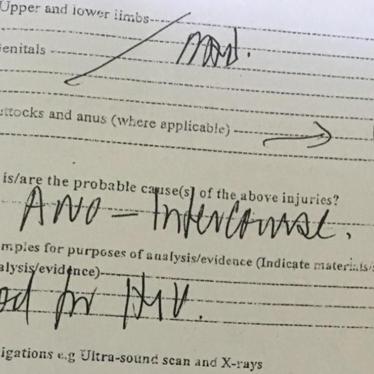Human Rights Watch (HRW) supports civil society efforts to reform the Kimberley Process in order to effectively tackle human rights problems linked to the diamond trade.
The Kimberly Process Certification Scheme is an international body that was established in 2003 to end the trade of “conflict diamonds.” It is made up of 54 participants, representing 81 countries, and observers from the diamond industry and nongovernmental organizations.[1]
Although the Kimberley Process has made important progress in curtailing the trade in “conflict diamonds,” the group’s long-term credibility and relevance have been undermined by a narrow focus on the activities of anti-government rebel groups and its unwillingness to incorporate human rights protections into its standards and operations.[2] The group's charter mandates a focus on “conflict diamonds” and narrowly defines that term to refer only to diamonds used by rebel groups to finance wars against legitimate governments. The Kimberley Process should adopt a broader focus on the full range of human rights abuses connected with diamond production, regardless of whether they are committed by governments, rebel armies, or private actors.[3]
HRW has also observed institutional failures by the Kimberley Process in both identifying violations of its standards and holding member states accountable for noncompliance. There is little independent monitoring of compliance with Kimberley Process rules and few penalties for violations.[4] Further, since the group makes decisions by consensus, rather than by voting, it is difficult for well-meaning countries to take action against a member that violates the rules if even one other member votes to block that action.
In light of these substantial issues, HRW has no intention of joining the Kimberley Process in any capacity. However, HRW affirms its support of other organizations that are attempting to reform the Kimberley Process as civil society observers. We will continue to urge the Kimberly Process to embrace its potential to help ensure consumers can know that the stones they purchase have not been mined in situations of grave human rights abuse.
[1] Kimberley Process, “Participants,” 2016, http://www.kimberleyprocess.com/en/participants.
[2] Human Rights Watch has previously highlighted this issue through reporting on human rights abuses associated with the Marange diamond fields in eastern Zimbabwe. HRW has repeatedly called on Kimberley Process members to demand an end to human rights violations and smuggling in Marange and to insist on transparency and accountability within Zimbabwe's diamond industry. See Human Rights Watch, Deliberate Chaos: Ongoing Human Rights Abuses in the Marange Diamond Fields of Zimbabwe, June 21, 2010, https://www.hrw.org/reports/2010/06/21/deliberate-chaos-0.
[3] Human Rights Watch, “Protect Jewelry Industry from the Taint of Blood Diamonds,” 2010, https://www.hrw.org/news/2010/02/01/blood-diamond.
[4] Human Rights Watch, “Zimbabwe: Diamond Abuses Show Need for Reforms,” 2012, https://www.hrw.org/news/2012/06/04/zimbabwe-diamond-abuses-show-need-reforms.








